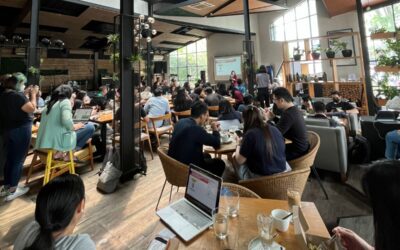Indonesian startups raised about $1.5 billion in Q2 2021 – above the month or month, pre-pandemic level. In Q1, the figure was even higher at $2.64 billion.
These statistics set the tone for a session at DealStreetAsia’s PE-VC Summit 2021, ‘Tales of resilience and growth among Indonesian companies during the COVID-19 pandemic’, sponsored by Alpha JWC Ventures.
Through the course of the session, the founders of startups across a diverse range of sectors gave deep insights on the strategies they had deployed to first survive and then grow and expand through multiple waves of the COVID-19 pandemic.
For Abraham Viktor, CEO, Hangry, part of the solution came from starting well before the pandemic and having adopted and optimized for a ‘delivery first’ model. He said, “When creating our chicken dish, we designed it to last in an enclosed package for two hours, and still remain crispy, warm, and juicy. That made a difference when the pandemic hit. Happy customers bring in more happy customers. Through the pandemic, we focused on making sure they were happy with safety measures, and a consistent product.” Hangry grew 22x through 2020. Its plans for the future include going deeper into Indonesia, driven by a less competitive scenario outside Jakarta and a more capital efficient structure in tier 2 and tier 3 markets.
Read also: Crisis Management Plan, Is It Important for Startups?
The hospitality sector was among the worst hit by the pandemic. However, through the course of COVID-19, Bobobox managed to pivot, offering a range of sanitized accommodation options. With its uniquely designed premises, some of which were launched in response to the pandemic, it was able to gain from the huge uptick in domestic tourism. Speaking about the lessons learned on the comeback trail CEO Indra Gunawan said, “The domestic market will be the main focus at least for the next 2 years. Budget accommodations are bouncing back faster and there will be a bias towards domestic travel. Given the preference for the outdoors, we decided to implement our modularity and space-efficient concepts as well as our technology in an open environment. That’s how we came up with BoboCabin.”
The increasing demand for healthy food, certainly benefited Lemonilo, an FMCG firm with a range of healthy food products including noodles and snacks. Driven by a digitally-led model which relies heavily on knowing the pulse of the consumer, Lemonilo was able to repurpose its manufacturing units to even create hand sanitizers to meet the demands of consumers. Co-CEO and co-founder Shinta Nurfauzia described how the company shifted to cater to unusual consumer demand and said, “We didn’t know that the indulgence category would be pandemic resistant. But we have really good inputs from our consumers about what they would like to consume. I think it’s because boredom sets in easily when you are forced to be at home.”
Alpha JWC Ventures co-founder and general partner Jefrey Joe believed the pandemic changed the landscape for investors as well as founders. He said, “Founders coming in after the pandemic were not only more risk-taking, but also more experienced, and serious about building startups. There was a lower quantity but higher quality.” Examining the patterns of investment, he added, it was easy to identify the investors who were really committed to Indonesia from those who were merely opportunistic.
The session was moderated by Joji Thomas Philip, editor-in-chief and founder, DealStreetAsia.
This article is originally posted on DealStreetAsia. Read the complete article here : https://www.dealstreetasia.com/partner-content/alpha-jwc-ventures-resilience-amid-pandemic/



